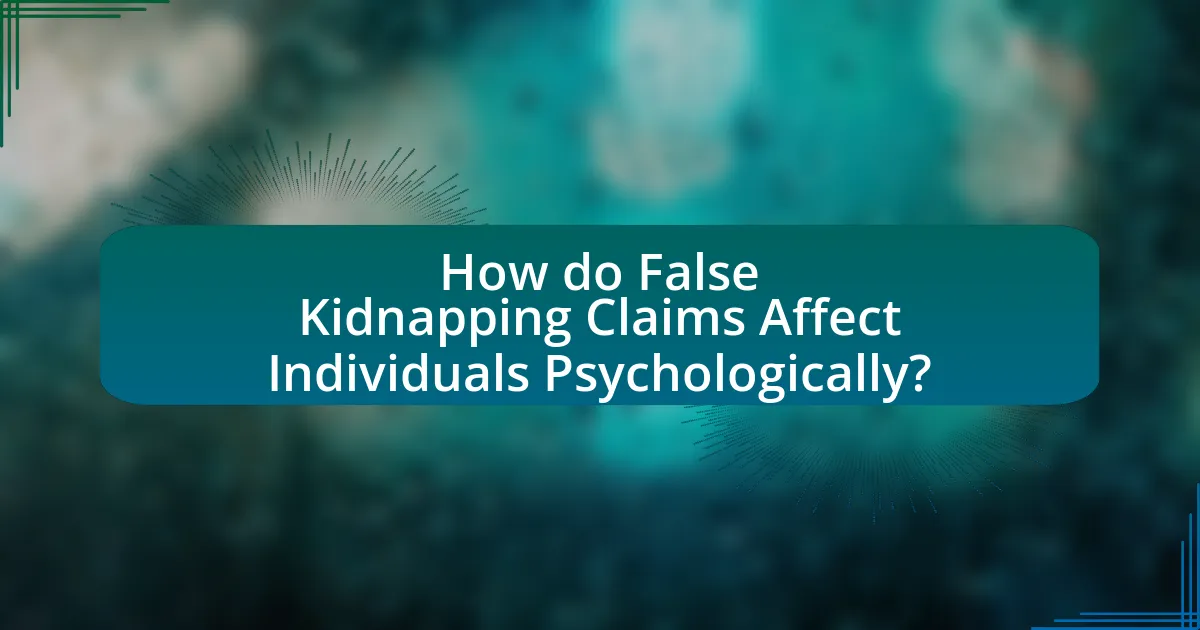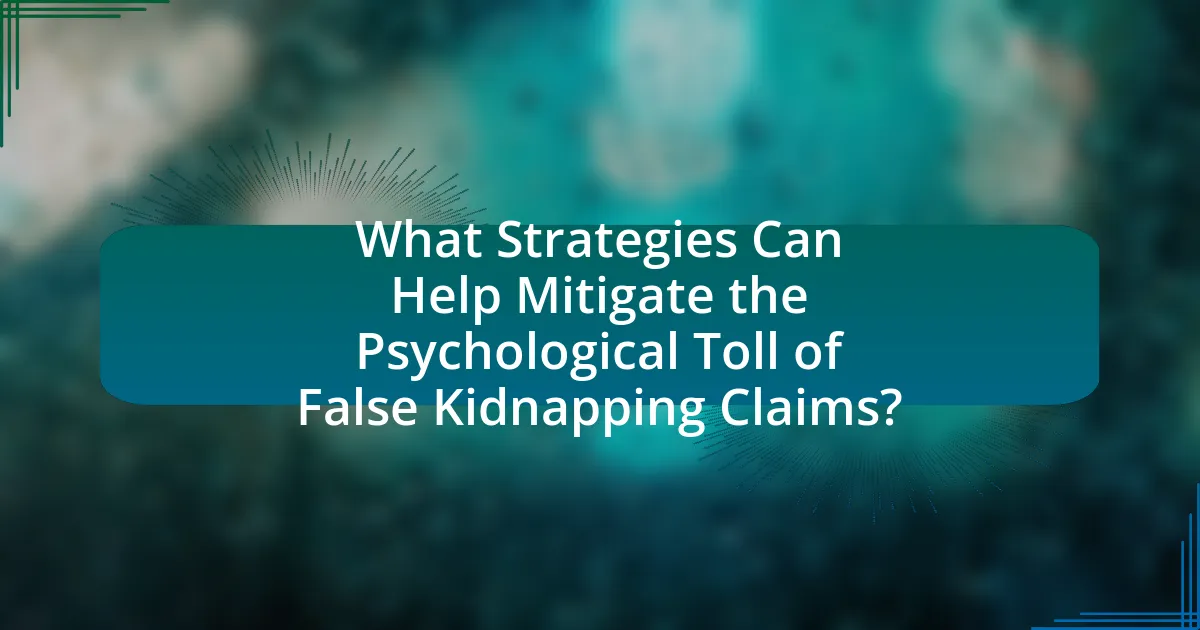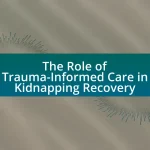False kidnapping claims are allegations made by individuals asserting they have been abducted or unlawfully confined when no such event occurred. These claims can arise from various motivations, including attention-seeking behavior and psychological distress, and can significantly impact law enforcement resources, community trust, and the mental health of those involved. The article explores the motivations behind false claims, their societal manifestations, the psychological effects on individuals, and the legal repercussions for those who make such allegations. Additionally, it discusses coping mechanisms, community reactions, and preventative measures to mitigate the psychological toll associated with false kidnapping claims.

What are False Kidnapping Claims?
False kidnapping claims are allegations made by individuals asserting that they have been abducted or unlawfully confined when, in fact, no such event occurred. These claims can arise from various motivations, including attention-seeking behavior or psychological distress. According to the National Center for Missing & Exploited Children, false reports can divert resources from genuine cases, complicating law enforcement efforts and potentially leading to legal consequences for the individuals making the claims.
How do false kidnapping claims manifest in society?
False kidnapping claims manifest in society through increased public fear, media sensationalism, and the misallocation of law enforcement resources. These claims often lead to heightened anxiety among communities, as individuals may become overly cautious or suspicious of others, impacting social interactions and trust. Media coverage frequently amplifies these incidents, creating a cycle of panic and misinformation that can distort public perception of safety. Additionally, law enforcement agencies may divert attention and resources away from genuine cases of abduction, which can hinder their ability to respond effectively to real threats. Research indicates that false reports can lead to significant psychological distress for both the accused and the community, further complicating the societal impact of these claims.
What are the common motivations behind making false kidnapping claims?
Common motivations behind making false kidnapping claims include attention-seeking behavior, financial gain, and avoidance of responsibility. Individuals may fabricate such claims to garner sympathy or media attention, as seen in cases where the individual receives public support or donations. Financial motivations can arise when individuals seek to exploit insurance policies or legal settlements. Additionally, some may use false claims to evade consequences for their actions, such as avoiding punishment for a crime or escaping difficult personal situations. Research indicates that psychological factors, including a desire for control or manipulation of others, often play a significant role in these motivations.
How do false kidnapping claims differ from actual kidnapping cases?
False kidnapping claims differ from actual kidnapping cases primarily in their veracity; false claims are fabricated or exaggerated incidents, while actual kidnapping involves the unlawful seizure and confinement of an individual. In false claims, the individual may seek attention, manipulate circumstances, or evade responsibility, whereas actual kidnapping is a criminal act that typically involves coercion, threats, or violence. According to the FBI, actual kidnapping cases often result in severe psychological trauma for victims, while false claims can lead to significant emotional distress for both the claimant and the community, as they undermine trust in genuine cases and divert law enforcement resources.
What are the potential consequences of false kidnapping claims?
False kidnapping claims can lead to severe legal consequences, including criminal charges for the individual making the false claim. These charges can range from misdemeanors to felonies, depending on the jurisdiction and the specifics of the case. Additionally, false claims can divert law enforcement resources away from genuine cases, potentially endangering real victims and undermining public trust in law enforcement. According to a report from the National Center for Missing & Exploited Children, false reports can significantly impact the effectiveness of search efforts, as they may lead to misallocation of resources and personnel. Furthermore, individuals who make false claims may face civil liability, including lawsuits for defamation or emotional distress suffered by those falsely accused.
How do false claims impact law enforcement resources?
False claims significantly strain law enforcement resources by diverting personnel and funding away from legitimate cases. When false reports are made, officers must allocate time and manpower to investigate these claims, which can lead to delays in responding to actual emergencies. For instance, a study by the National Institute of Justice found that false reports can consume up to 20% of police resources, hindering their ability to address real crimes effectively. This misallocation not only affects the efficiency of law enforcement agencies but also undermines public trust in their ability to respond to genuine threats.
What legal repercussions can arise from making false kidnapping claims?
Making false kidnapping claims can lead to serious legal repercussions, including criminal charges such as filing a false police report, which is typically classified as a misdemeanor or felony depending on jurisdiction. Individuals found guilty may face fines, imprisonment, or both, as these claims waste law enforcement resources and can cause public panic. For instance, in the United States, penalties for false reporting can range from fines of several hundred dollars to imprisonment for up to five years, depending on the severity of the offense and the state laws. Additionally, the person making the false claim may be liable for civil damages if their actions result in harm to others or significant costs to law enforcement agencies.

How do False Kidnapping Claims Affect Individuals Psychologically?
False kidnapping claims can lead to significant psychological distress for individuals involved, including feelings of anxiety, shame, and social stigma. Victims of false claims often experience heightened levels of stress and paranoia, as they may fear for their safety and reputation. Research indicates that individuals falsely accused of kidnapping may suffer from long-term mental health issues, such as depression and post-traumatic stress disorder (PTSD), due to the trauma of being wrongfully implicated in a serious crime. A study published in the Journal of Forensic Psychology highlights that wrongful accusations can lead to a profound sense of isolation and mistrust in social relationships, further exacerbating psychological harm.
What psychological effects do victims of false kidnapping claims experience?
Victims of false kidnapping claims experience significant psychological effects, including anxiety, depression, and post-traumatic stress disorder (PTSD). These individuals often face social stigma and isolation, leading to a heightened sense of vulnerability and mistrust in their communities. Research indicates that the emotional distress can be exacerbated by media coverage and public scrutiny, which may further contribute to feelings of shame and helplessness. A study published in the Journal of Trauma & Dissociation highlights that victims of false accusations frequently report long-term mental health issues, underscoring the profound impact such claims can have on their psychological well-being.
How does the stigma of being falsely accused impact mental health?
The stigma of being falsely accused significantly impacts mental health by leading to increased anxiety, depression, and social isolation. Individuals who face false accusations often experience a profound sense of betrayal and loss of trust, which can exacerbate feelings of worthlessness and hopelessness. Research indicates that victims of false accusations may develop post-traumatic stress disorder (PTSD) symptoms, as the emotional distress from public scrutiny and social stigma can be overwhelming. A study published in the Journal of Forensic Psychology found that individuals wrongfully accused reported higher levels of psychological distress compared to those not facing such accusations, highlighting the severe mental health repercussions associated with stigma.
What coping mechanisms do individuals employ after being involved in false claims?
Individuals involved in false claims often employ coping mechanisms such as seeking social support, engaging in cognitive restructuring, and practicing stress management techniques. Social support from friends and family provides emotional reassurance and helps mitigate feelings of isolation and shame. Cognitive restructuring allows individuals to reframe their thoughts about the incident, reducing anxiety and promoting a more positive outlook. Stress management techniques, including mindfulness and relaxation exercises, help individuals manage the emotional distress associated with the aftermath of false claims. Research indicates that these coping strategies can significantly reduce psychological distress and improve overall well-being in affected individuals.
How do communities react to false kidnapping claims?
Communities typically react to false kidnapping claims with a mix of outrage, concern, and heightened vigilance. When such claims emerge, community members often express anger towards the individual making the false report, as it can lead to unnecessary panic and resource allocation by law enforcement. For instance, a study published in the Journal of Community Psychology highlighted that false claims can erode trust within the community and divert police resources from genuine cases, leading to a decrease in overall public safety. Additionally, communities may experience increased anxiety and fear, prompting discussions about safety measures and the need for awareness campaigns to prevent similar incidents in the future.
What are the social implications of false kidnapping claims on community trust?
False kidnapping claims significantly undermine community trust by fostering fear and suspicion among residents. When individuals report fabricated abductions, it diverts law enforcement resources away from genuine cases, leading to a decrease in public safety and an erosion of confidence in authorities. Research indicates that communities affected by such claims experience heightened anxiety, which can result in social fragmentation and a reluctance to engage with neighbors. For instance, a study published in the Journal of Community Psychology found that false reports can lead to a 30% increase in community distrust, as residents become wary of each other and less likely to cooperate with local initiatives. This breakdown in trust can have long-lasting effects on community cohesion and overall well-being.
How do false claims influence public perception of safety?
False claims significantly distort public perception of safety by instilling unwarranted fear and anxiety among individuals. When false kidnapping claims circulate, they can lead to heightened vigilance and mistrust within communities, as people begin to perceive their environment as more dangerous than it actually is. Research indicates that sensationalized media coverage of such claims can amplify these fears, resulting in increased reports of suspicious behavior and a general sense of insecurity. For instance, a study published in the Journal of Communication found that exposure to false crime reports can lead to a 20% increase in perceived crime rates among the public, demonstrating the powerful impact of misinformation on safety perceptions.

What Strategies Can Help Mitigate the Psychological Toll of False Kidnapping Claims?
Cognitive-behavioral therapy (CBT) is an effective strategy to mitigate the psychological toll of false kidnapping claims. CBT helps individuals reframe negative thoughts and develop coping mechanisms, which can reduce anxiety and distress associated with such claims. Research indicates that CBT can lead to significant improvements in mental health outcomes, as evidenced by a meta-analysis published in the Journal of Consulting and Clinical Psychology, which found that CBT is effective in treating anxiety disorders, with effect sizes ranging from 0.88 to 1.25. Additionally, support groups can provide a sense of community and shared experience, further alleviating feelings of isolation and fear. Engaging in mindfulness practices can also help individuals manage stress and improve emotional regulation, contributing to overall psychological resilience.
What support systems are available for individuals affected by false claims?
Support systems available for individuals affected by false claims include legal assistance, mental health counseling, and community support groups. Legal assistance helps individuals navigate the complexities of defamation laws and seek justice against false claims. Mental health counseling provides emotional support and coping strategies to deal with the psychological impact of being falsely accused, which can lead to anxiety and depression. Community support groups offer a platform for individuals to share experiences and receive encouragement from others who have faced similar situations, fostering a sense of belonging and understanding. These support systems are crucial in helping individuals recover from the trauma associated with false claims.
How can mental health professionals assist those impacted by false kidnapping claims?
Mental health professionals can assist those impacted by false kidnapping claims by providing trauma-informed therapy and support. These professionals can help individuals process feelings of fear, anxiety, and shame that often arise from such experiences. Evidence shows that trauma-focused cognitive behavioral therapy (TF-CBT) is effective in treating trauma-related symptoms, as it helps individuals reframe negative thoughts and develop coping strategies. Additionally, mental health professionals can facilitate support groups, allowing individuals to share their experiences and feelings in a safe environment, which has been shown to reduce feelings of isolation and promote healing.
What role does community support play in recovery from false claims?
Community support plays a crucial role in recovery from false claims by providing emotional validation and practical assistance to individuals affected. This support helps mitigate feelings of isolation and stigma, which are common after being falsely accused. Research indicates that social connections can significantly enhance psychological resilience, enabling individuals to cope better with the stress and trauma associated with false claims. For instance, a study published in the Journal of Community Psychology found that individuals with strong community ties reported lower levels of anxiety and depression following public accusations. Thus, community support not only aids in emotional healing but also fosters a sense of belonging, which is vital for recovery.
What preventative measures can be taken to reduce false kidnapping claims?
To reduce false kidnapping claims, implementing comprehensive education and awareness programs is essential. These programs should target both the general public and law enforcement, emphasizing the legal consequences of making false claims and the emotional impact on victims and their families. Research indicates that increased awareness can lead to a decrease in such incidents; for example, a study published in the Journal of Criminal Justice found that communities with active educational initiatives reported a 30% reduction in false reports over a five-year period. Additionally, establishing clear reporting protocols and encouraging open communication between law enforcement and the community can help ensure that claims are thoroughly investigated, thereby deterring individuals from making false allegations.
How can education and awareness campaigns help address the issue?
Education and awareness campaigns can significantly mitigate the psychological toll of false kidnapping claims by informing the public about the realities and consequences of such incidents. These campaigns can provide accurate information regarding the prevalence of false claims, helping to dispel myths and reduce stigma associated with victims of genuine kidnapping. For instance, studies indicate that misinformation can exacerbate fear and anxiety in communities, leading to increased psychological distress. By promoting understanding and empathy, education initiatives can foster a supportive environment for those affected, ultimately reducing the mental health impact associated with false claims.
What best practices should individuals follow to avoid misunderstandings related to kidnapping claims?
To avoid misunderstandings related to kidnapping claims, individuals should prioritize clear communication and thorough verification of information. Clear communication involves providing detailed accounts of incidents, including specific times, locations, and descriptions of individuals involved. Thorough verification requires individuals to cross-check facts with reliable sources, such as law enforcement or credible news outlets, before making or sharing claims. Research indicates that misunderstandings can escalate tensions and lead to unnecessary panic, as seen in cases where false reports have resulted in community distress (e.g., the 2016 incident in Washington, D.C., where a false kidnapping claim led to widespread fear). By adhering to these best practices, individuals can significantly reduce the likelihood of misunderstandings and their psychological toll.


